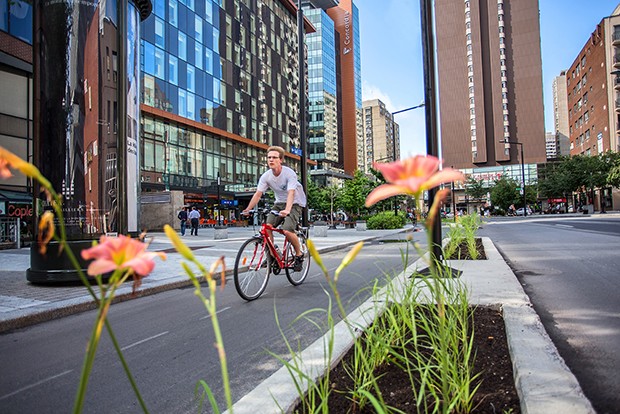The future of sustainable transport in Montreal
 One City: One Week aims “to integrate planning for different modes of eco-friendly transport.” | Photo by Concordia University
One City: One Week aims “to integrate planning for different modes of eco-friendly transport.” | Photo by Concordia University
Cyclists are an ever-growing presence on Montreal’s streets.
In recent years, the city has added to its bicycle infrastructure, dedicating parts of downtown thoroughfares like De Maisonneuve Boulevard to two-wheeled transport. It also introduced Bixi, a bike-share system. And next year, one of its boroughs, the densely populated Plateau Mont-Royal, may be home to streets that welcome only bicycle and pedestrian traffic.
As the way we circulate through the city has changed, new challenges — and opportunities — have arisen. From June 2 to 6, Concordia’s Department of Geography, Planning and Environment is seeing to address these developments with One City: One Week, a two-part workshop about transportation infrastructure and the changing face of sustainable transportation in Montreal.
Zachary Patterson, an assistant professor in the department, explains that the conference aims “to better integrate planning for different modes of eco-friendly transport in order to improve them and increase their use.”
To that end, the first part — “Bike Lab Montréal 2014,” co-organized by Vélo Québec — examines the realities of urban cycling. On June 2 and 3, experts from the organization, as well as Quebec’s transport ministry and Polytechnique Montréal, are leading a series of presentations, discussions and workshops on the city’s bicycle infrastructure.
“‘Bike Lab Montréal 2014’ will really be out in the field,” Patterson says. “They’ll be going to different intersections, counting cyclists, assessing areas and looking at particular locations that it may be possible to improve.”
The second half of the conference, the “Canada-Germany Hands-On Sustainable Urban Mobility Workshop” from June 4 to 6, is an applied research event aimed at researchers, students and transportation planners.
Over the course of three days, academics from institutions as diverse as the University of Waterloo, Portland State University and the Karlsruhe University of Applied Sciences will discuss the latest findings on sustainable urban mobility.
Patterson expects to learn a lot from his European colleagues.
“Germany is really far ahead in terms of its integration of transport infrastructure, including its cycling infrastructure, and the systems it has.”
Patterson himself will present a paper using Stated Preference methods in pedestrian planning of infrastructure. The study was undertaken at Concordia’s Transportation Research for Integrated Planning (TRIP) Lab in collaboration with researchers from McGill University and Polytechnique Montréal.
The team presented respondents with 3D traffic simulations of different roundabouts. Some were high-traffic, others low; and while some had pedestrian crossings, others only had signs. The number of lanes also varied.
“By asking people to choose between these types of alternatives, we’ve been able to evaluate how important the different features are to them as pedestrians,” he says.
Ultimately, Patterson hopes his research helps urban planners decide on the trade-offs that would make roundabout intersections more pedestrian-friendly. He expects the conference to allow him and others build networks that will further this sort of work.
“This is a good opportunity,” he says. “We’ll be able to share the research that’s being done at Concordia internationally.
One City: One Week takes place from June 2 to 6.
Workshops will be held in Room EV-2.260 of the Engineering, Computer Science and Visual Arts Integrated Complex (EV Building, 1515 Ste. Catherine St. W.) on the Sir George Williams Campus. Entry to “Bike Lab Montréal 2014” costs $520. Entry to the “Canada-Germany Hands-On Sustainable Urban Mobility Workshop” costs $110.
Check out the complete One City: One Week program.